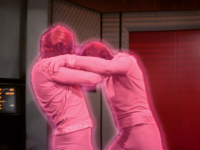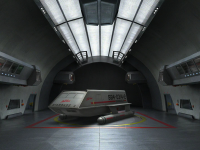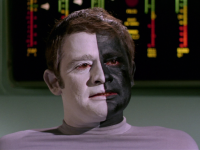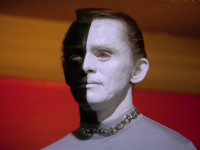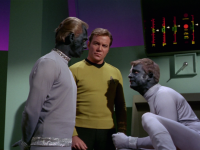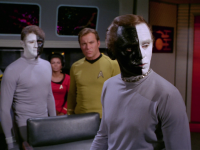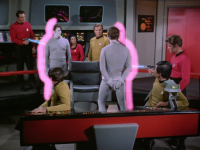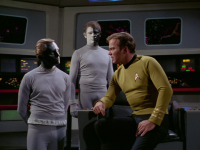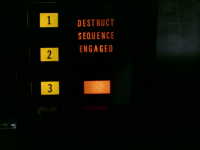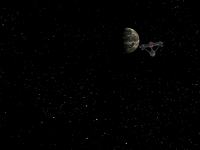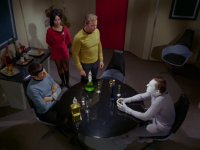Star Trek: The Original Series — 3x15 — Let That Be Your Last Battlefield
Synopsis
Two survivors of a devasted planet remain committed to destroying one another.
Filler rating: good filler
There's no essential plot or exposition in this episode that renders it unskippable, but it's a decent episode, even though it could have been better.
Remarkable scenes
- Kirk's first conversation with Lokai. I love how blatantly hostile Kirk is.
- Kirk playing mediator.
- I love the scene where the auto destruct sequence was being set. Some interesting camera work there.
- Kirk: "Mr. Spock, is this ship headed for Ariannus?" Spock: "Negative, captain. The Enterprise is now moving in a circular course." Scotty: "And at warp 10 we're going nowhere mighty fast."
- Chekov: "There was persecution on Earth once. I remember reading about it in my history class."
- Seeing Cheron a dead planet.
- Spock: "All that matters to them is their hate." Uhura: "Do you suppose that's all they ever had, sir?" Kirk: "No. But that's all they have left."
Review
This episode is an intriguingly stylized satire of racism; black vs. white racism of the real world in particular. The half-moon aliens do a nice job of demonstrating the innate silliness of racial prejudices by creating a racial difference between the aliens that seems so insignificant to us and yet so significant to them as to automatically shame us for ever having acted like them. That's the power of a science fiction story on society: the power of analogy. These aliens would have been a ridiculous analogy in a real world 19th or 20th century debate on race relations, but in the world of Star Trek where many more things are possible they're not so ridiculous after all.
Sure, the whole idea that such a skin pigmentation would ever be favored by natural selection seems patently ridiculous, but Spock wastes no time pointing that out early in the episode. As long as the story itself acknowledges how unlikely such a thing should be before brazenly going with it, I suppose I can live with it. The layers of absurdity are even nicely staggered. At first Spock assumes that Lokai must be one of a kind for his species. Then when the commissioner comes aboard, Spock is amazed and struck with near-disbelief that all their people must have evolved to be this way and it isn't just a fluke.
Likewise, Spock points out one of my favorite medical cliches to pick on: McCoy is once again using Federation drugs on an unknown alien. I loved McCoy's response insisting that most humanoid life forms have similar anatomy; the blood may be slightly different and the organ configuration may be slightly different, but medical principles are largely sound across species. I also loved the fact that McCoy conceded the fact that it's hard to give a prognosis on a totally unknown alien despite the anatomical similarities. This is the sort of careful scriptwriting that should have been present in earlier episodes.
As for the story itself, I enjoyed the details concerning extradition law, which made a lot of sense for the situation. The Federation's policy on trying Lokai for his domestic crime before considering extradition back to Cheron certainly seemed reasonable and I thought the off the record note that the Federation would most likely grant extradition after his trial in the Federation was a nice touch. It added some humanity to the usual faceless bureaucracy.
Sadly that nice detail was somewhat undermined by the fact that neither of the half-moon aliens seemed content to wait out Federation due process and mediation. They've been keeping chase for some 50,000 years and yet they acted with such impatience while aboard the Enterprise. If they've been at it that long, why not wait a short while longer to see the process through to the end legally?
At least the commissioner had the good sense to let Kirk complete his humanitarian mission before irrevocably commandeering the ship for a course to Cheron, but it all could have been done with considerably less fuss. Although the manufactured drama did give us an opportunity to explore that delightfully overwrought self destruct scene. The camera work in that scene was a lot of fun although not all of their directoral experiments were a success. We've also seen the unwelcome return of the camera zooming in and out on the red alert light, which is nauseating and serves no purpose.
You've got to wonder how Kirk even knew the commissioner wouldn't be able to stop the auto destruct sequence when he had already displayed what appeared to be limitless control over the ship's systems by that point. Maybe it was a desperate bluff. The half-moon aliens had some pretty vaguely overwrought technology at their disposal in general. Throughout the course of the episode they displayed immunity to phasers, apparent telepathic control over the ship's navigational systems, and somehow temporarily enhanced the warp drive to safely fly faster than its typical capabilities.
Although the Enterprise itself possessed some pretty overwrought capabilities as well. I cringed a bit when the Enterprise somehow globally decontaminated Ariannus entirely from orbit in the space of a minute or two. That's some powerful tech.
Other logical oddities of the story include the scene when Lokai gets up and walks out of sickbay without anyone noticing. Apparently no one was guarding the Federation's detained prisoner scheduled to be tried for grand theft shuttlecraft. Likewise, it's kind of ridiculous to assume that not a single survivor was left on Cheron. Even a total nuclear war would leave some survivors, huddling together far from the blast sites, living off of subsistence farming or something. Though given the overwrought technologies of the episode, perhaps they were all killed by some kind of super-effective biological weapon released into the atmosphere globally all at once like the Enterprise's Ariannus decontaminator.
One final amusement: you've gotta love the cost cutting tricks in this episode. An invisible ship saving them from needing a ship model, the destruction of Cheron which is actually just stock video from World War II, and the fact that we never actually see the half-moon aliens on the surface of Cheron ever. The Enterprise just cynically leaves orbit and dooms them to their mutual annihilation. I can't blame Kirk for doing that, honestly. They've been such poor guests, why bother saving them from their self-inflicted fate? Indeed it's an effective satire of racism. With more polish I have no doubt that this episode could have easily been worth a perfect or near perfect score.
